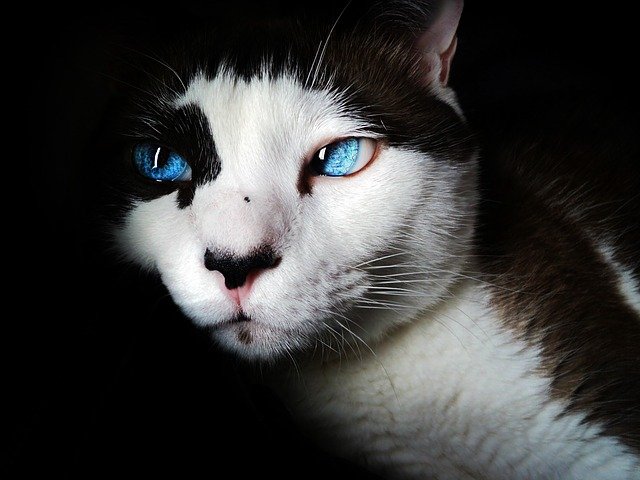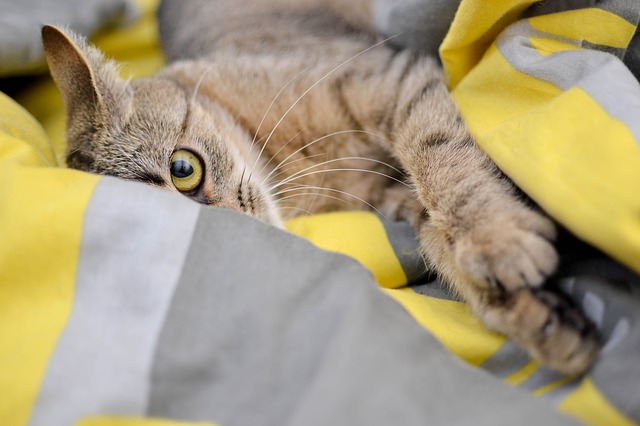
Cats are both incredible and incredibly finicky. Whether it’s grooming your cat, taking it in for check-ups at the vet, or arranging a diet that meets its nutritional needs, you’ll be putting plenty of effort into caring for your feline friend. Read on to pick up some handy tips you can use to make yourself a more responsible cat owner.
Drape cords should be kept distant from cats. You should not allow your cat to play with drape cords since they could end up with the cord wrapped around their neck. This accident could trap or injure your cat, or even be fatal. All drape cords should be fastened and kept away from any harm that might come to the cats.
Older cats will appreciate a heated bed; you can use a heated tile to create one! Simply heat a terra-cotta tile in a 200 degree oven for 20 minutes. Wrap this in a towel that’s old and then place it under the bed the cat sleeps on. When the tile cools down, change it out for a fresh, warm one.
When your female cat is old enough, it’s vital to get her spayed. You may not think it’s necessary if you have an indoor cat, but your cat may escape. Spray your cat so that this does not occur.
It can be tough to keep cats off the countertops. Cats love being up high so that they can see. One way to deal with this issue could be to devote certain high spaces for your feline friend to sit in. A carefully placed cat tower in the kitchen will keep cats away from the counter.
You might find that your cat sleeps all day and wants to be active at night. This means that they will usually be quite active at night. If you have trouble sleeping because of cats, you may want to close the door to your bedroom. You won’t be able to hear their sounds as they walk around in the middle of the night.
You should be sure to place your pet’s litter box in a good location. Never put the box near your cat’s food, and pick a quiet place away from areas that are heavily used. Choose an area that is well-ventilated to avoid bad smells. Your cat will be more comfortable and you will too.
Try not to let your cat go outside. Going outdoors isn’t very safe for a domesticated cat. It takes mere minutes for your cats to pick up fleas, be bitten by a tick or something far worse. Cars, people, or animals could hurt your beloved pet. If you allow your cat outside, make sure you live in a reasonably safe area.
Do you have a cat and a dog? Dogs will always try to eat a cat’s food. Thus, you must keep cat food out of the dog’s reach. That also means they don’t fight about water after eating the food.
Brush your cat daily. This will help stimulate blood flow. Additionally, brushing helps to expedite hair shedding. This helps prevent hairballs, which can lead to choking and other health issues.

Use canned food for your cat. It sometimes has more benefits over dry. Canned food provides more water content for your cat as well as more fat and protein. For aging cats, it is also easier to chew. Speak with a vet, but know that wet food is normally much better for your pet.
Litter Box
Where did you put the litter box? You are surely tempted to put it where the smell will affect your surroundings the least. You have to accept the fact that easy access for your cat is the first priority in choosing a spot for the litter box. Cats are finicky, so you must provide an environment that is not inconvenient or off-putting to the animal. If your litter box location is on a cold floor, you may want to put a rug underneath of the box.
Give the cat a collar with your contact information. This should be done even with an indoors cat. The animal could get out. If this happens, ensure there’s a way they can find home again.
If you own a declawed cat, do not let it outdoors. A clawless cat will have no defense against other animals, and when they’re outside they’ll run risk of death or injury. Indoor cats can be declawed, though. It is important to note that if you are declawing a cat, only the front claws on the cat should be removed. Don’t have the back claws removed, since cats don’t use them to scratch up your house.
If you are lucky enough to have a cat that has a lot of hairballs, and brushing doesn’t seem to be helping to lessen them, then the following tips might help. Add one teaspoon of pumpkin to your cat’s food. Try also mixing in some water from tuna with the pumpkin. Some cat foods have components, such as fiber, that prevent hairballs.
Avoid overfeeding your cat, as that may lead to health concerns in the long-term. They can develop diabetes or heart disease, just like humans. Keep an eye on how much your pet is eating, and be sure that their diet is balanced.
If you worry about the cat you have getting fleas, rabies, or any kind of fungus then the cat shouldn’t go outside. While it is true that even an indoor cat can contract illnesses, they are more prevalent with cats who frequently go outdoors.
Think about restricting your cat to only indoors. Research has shown that cats who go outside regularly do not live as long. In addition, they are more prone to contracting all kinds of diseases. Some diseases even have the possibility of spreading to people in your home. Give your indoor kitty a sunny location, like a window or sun room, to sit in daily in order to help meet his desire to be outdoors.
Owning a cat means a fair amount of work on your part. Use these tips to become a better cat owner and to really enjoy it. Knowledge can help you have a much better relationship with your pet.